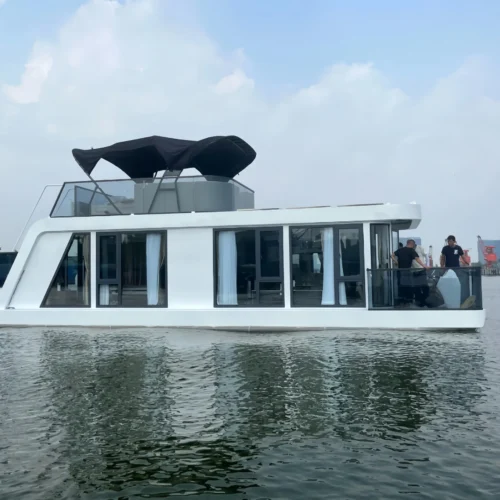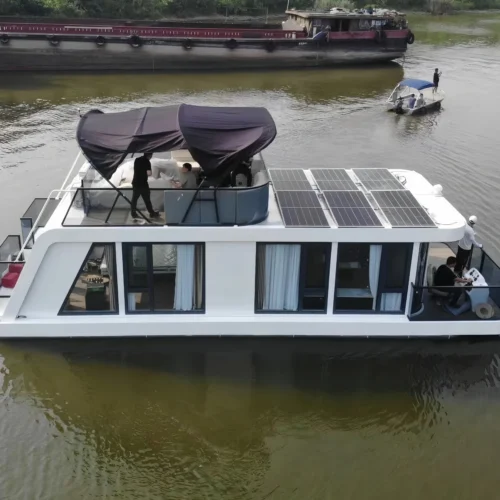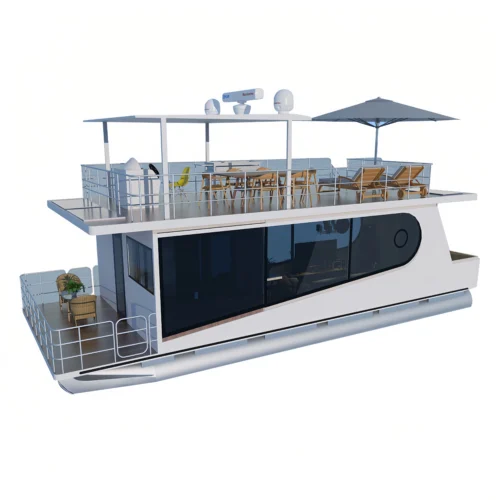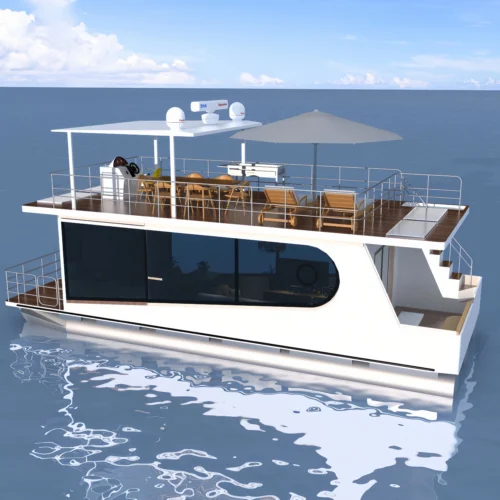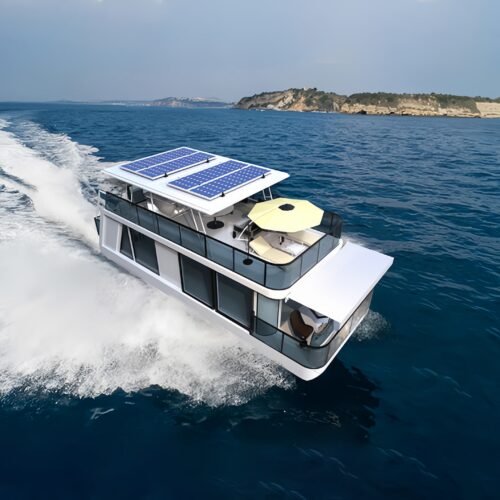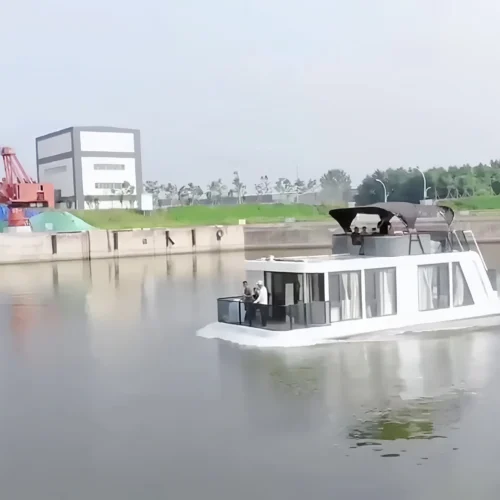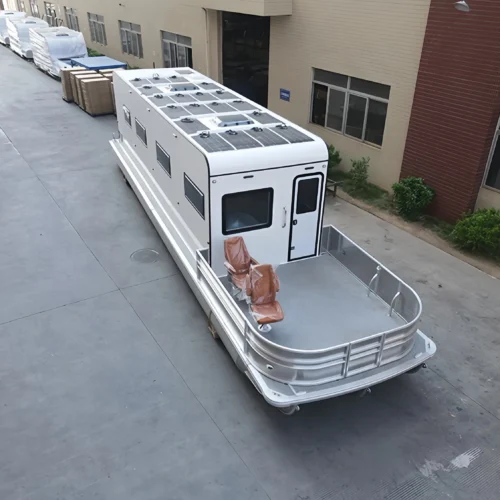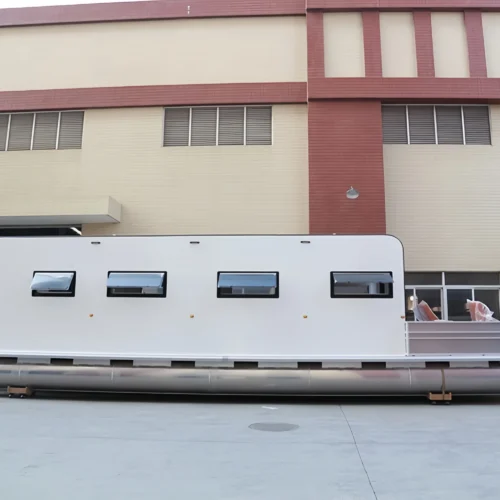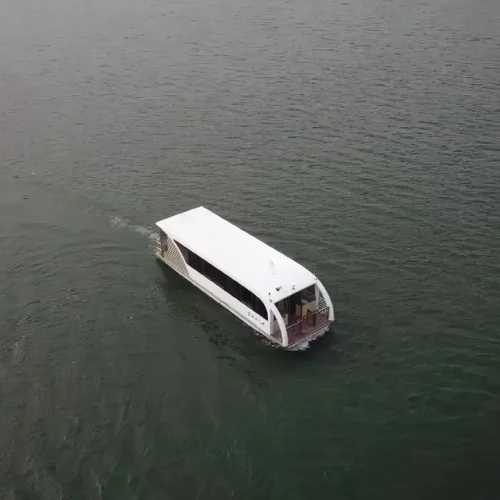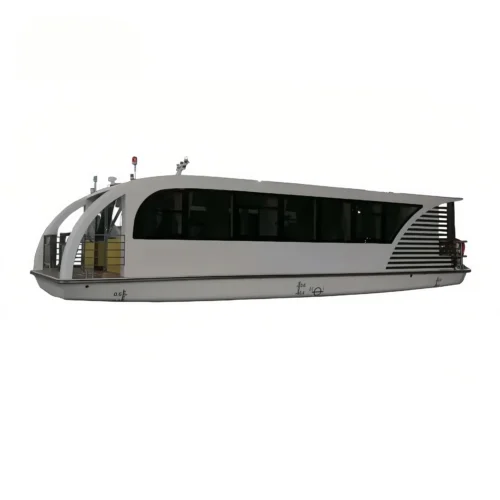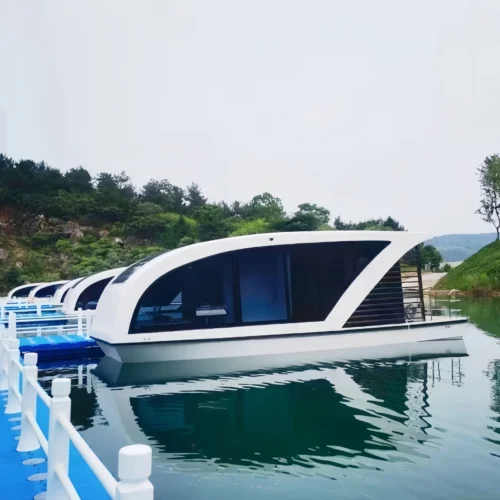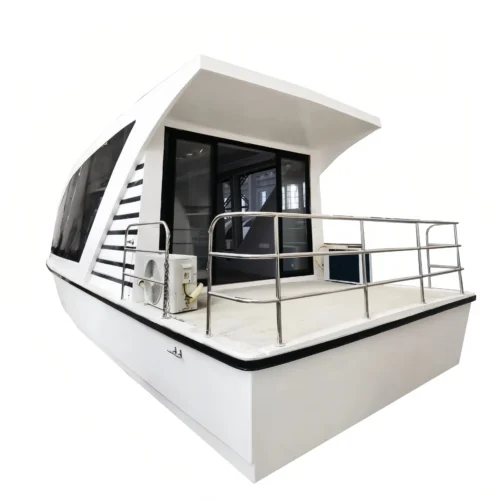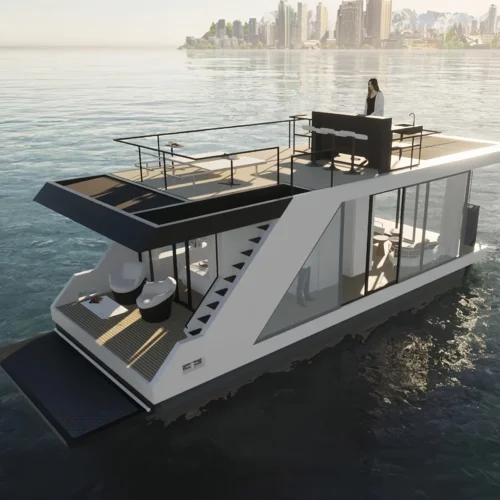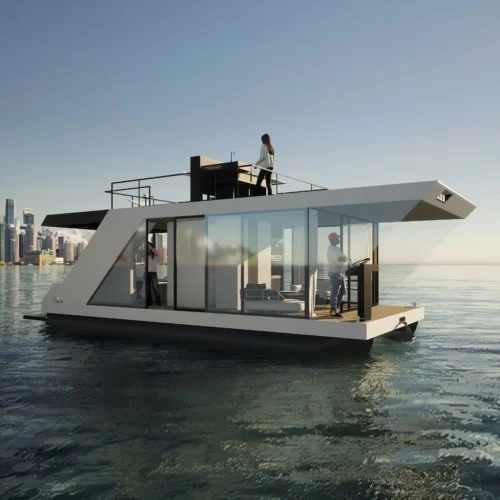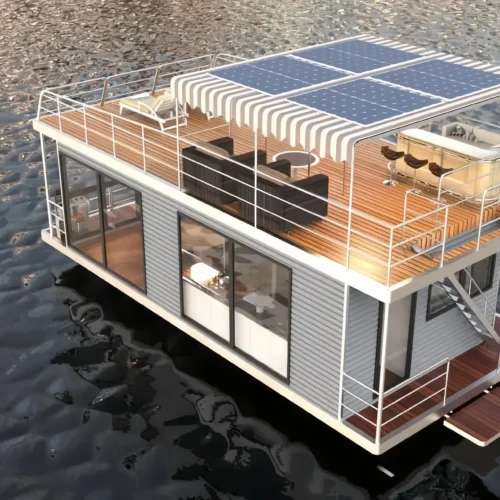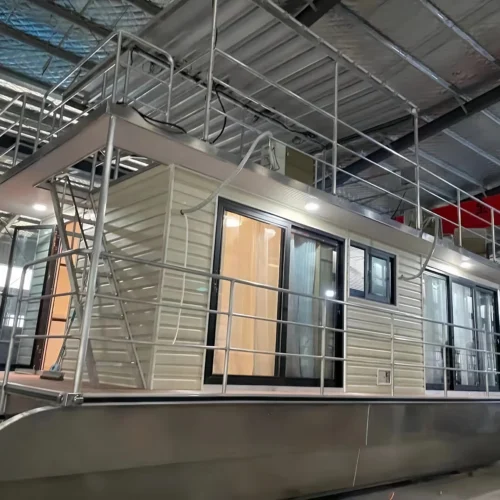Houseboat FAQs
1. What are houseboat?
As the name of houseboat expresses, it is a combination of a house and a boat. Unlike the old house that was fixed on the land, the houseboat aims for those who want to feel the life on the water.
Likewise, unlike the small civilian boats we commonly see, houseboats can be not only as a means of transportation, but also as a family. They have more complete living facilities and are usually equipped with bedrooms to support people spending the night on the water.
Of course, not all houseboats are motorized. For those who want to make their home on the water for a long time, it will be more convenient to choose a fixed mooring as a base.
2. How much does a houseboat cost?
Not surprisingly, the houseboat has the highest ex-works price of any common civilian vessel. The larger size and more complete living facilities make the vessel more costly.
If you are looking forward to owning a houseboat, then you should definitely prepare at least more than $60,000 on a boat fund.
Unfortunately, for that kind of money, you can usually only get a used houseboat with a long history, because even pre-built new boats on the market today usually start at $75,000, not to mention the custom models, which usually cost more than $200,000.
Of course, the price of houseboats of different sizes, materials and configurations will also vary.
All in all, owning a brand new houseboat usually costs around $150,000 to $500,000.
Fortunately, NeoBoats website is very proud to have the representation of several famous houseboat yards.
We have cheaper selling discounts than 80% of the houseboats on the market. Contact us with your needs and tell us what you want to customize your own new boat at 40% below the market price.
3. Can you live on a houseboat?
Houseboat is certainly the best choice for those who look forward to spending the night close to nature on the water. Houseboat also proves this with its layout design and functionality.
Even the most compact houseboats reserve bedrooms or lounges for passengers to support them to lie down and rest comfortably.
Of course, many modern house boats have incorporated the habits of people nowadays. In addition to daily life scenarios, more essential facilities for living, such as electricity, plumbing, and air conditioning, have been added to support a more comfortable life on the water.
4. Can you live in a houseboat year round?
In fact, many people live on board for a long time after they have their own houseboat.
Of course, there are also people who choose a houseboat as a long-term residence because they don't have enough money to buy a house, and the cheaper houseboat can meet all the needs of life.
The quality of the vast majority of houseboats is absolutely reliable, and they can last at least ten years of long-term life, based on regular maintenance and cleaning by people.
Many houseboats are equipped with cozy bedrooms, functional kitchens, wet and dry toilets and bathrooms, as well as spacious living rooms and open-air balconies.
Usually, the materials used to build the house are also fireproof and insulated to ensure the comfort and safety of the occupants.
In addition, the perfect electrical system and water system are also important to ensure that people can live on the water for a long time.
Therefore, the outdoor life of people on the water is just as colorful. All in all, houseboats are basically a perfect "replica" of all aspects of living on the water.
But we must also acknowledge that there is a definite gap in the quality of life on a boat compared to a traditional home.
The limited storage space on boats means that people have to simplify their lifestyles. The inaccessibility of water, electricity and gas, as well as the problem of sewage and household waste disposal, require more time and effort from people.
5. How to live on a houseboat?
Being close to nature without leaving home on a houseboat sounds like a very unique and fun way to live.
If you are thinking of living in a houseboat for a long time, there are a few things you need to consider to make your life more comfortable and safe.
First of all, finding a reliable slip for your waterway can add to your happiness. A good marina should usually be close to a supply house that provides easy access to electricity, fresh water, and some of the supplies you and your family need to get by.
Of course, if your boat uses a solar power system, then the power issue becomes simple.
Second, we need to have a strategy for dealing with the changing weather, especially the extreme cold days. Equipping the boat with some well-insulated materials or air conditioning and heating equipment will make the life on the boat more comfortable.
Then, the right changes in your lifestyle will also make life on the water more bearable. We must realize that a houseboat does not have the spacious storage and comfortable lifestyle that traditional houses have.
To feel comfortable in a limited space, it is better to reduce our belongings and prioritize those that are multi-functional.
Finally, we also need to maintain and care for the boat on a regular basis. A boat in the water needs more care than a traditional home, both for wear and for leaks. Cleaning and inspections should also be more frequent.
6. Do houseboats have electricity?
Today's society depends on electricity for all aspects of life. Fortunately, most modern houseboats are equipped with a complete electrical system to run essential equipment such as appliances, lighting and air conditioning.
Similar to RV power, houseboats are typically powered by dockside power stations, generators, solar panels and batteries.
Docking a boat at a utility dock is a great option for people who want to live on the water for an extended period of time. By plugging directly into the shore power grid, any large appliances can run more freely.
If the boat is far from shore power, then the fuel generator can also solve the problem of electricity for living.
Of course, it is also a good choice to install solar electric panels for houseboat and enjoy the gift of nature. Solar power is more reliable and economical in the outdoors away from the human world.
In fact, there are many houseboats equipped with large storage capacity batteries in case of emergency when the boat is offshore.
Overall, in today's increasingly technologically advanced world, houseboat electricity is not a problem for residents. As people simplify their lifestyles and eliminate waste, electricity usually does not bother them.
7. Do houseboats have air conditioning?
With global warming, the vast majority of people have long been inseparable from air conditioning in the summer.
And the heat in a houseboat is higher than in a traditional house in the outdoor summer. Therefore, air conditioning has also become a necessary facility for most houseboats.
Houseboat air conditioners, usually installed in bedrooms and living rooms, can ensure people's comfort for sleeping and relaxing.
It is worth mentioning that air conditioners are also large power appliances, so you need to make sure that there is enough power for it to run effectively.
Of course, if you are an eco-conscious person, you can also choose a more energy-efficient, eco-friendly fan to cool down.
8. Do houseboats have WiFi?
For individuals or families who want to live on a houseboat for a long time, WiFi is usually another plus in addition to complete electricity and water and gas systems. Unfortunately, not all houseboats will include WiFi as a guarantee.
But for personal houseboats, we can totally set up our own WiFi network when the need arises. All we need is a mobile hotspot or similar device and connect it to the cellular network and we're done.
Of course, there are many marinas that provide WiFi service for docked boats, but the status of the network may vary depending on the location.
9. How do houseboats dispose of sewage?
If you have experience with RV living, you will understand the houseboat way of thinking about wastewater treatment.
Many houseboats will use gray water tanks to store wastewater and then periodically use the marina's pumping facilities to transfer the waste to the local sewer system for uniform treatment.
Of course, there are also houseboats that install onboard Marine Sanitation Devices (MSDs), which effectively treat wastewater chemically or biologically, after which it can be returned to nature.
For eco-minded people, however, composting toilets are more ecologically conscious. They separate liquid and solid waste, eventually turning them into fertilizer or regular garbage.
It is worth noting that in most parts of the world, it is illegal to discharge untreated sewage directly into waterways. Therefore, it is imperative to choose an environmentally friendly way to dispose of what your houseboat produces.
10. Do houseboats have motors?
Yes, the majority of houseboats are equipped with a reliable motor to facilitate the occupants to move the boat from one place to another easily.
These types of boats are usually designed for people to travel and vacation in fresh water for leisure.
However, not all houseboats are suitable for transportation. Some houseboats are designed for long-term living on the water.
Because people always moor them in a fixed position for long periods of time, the engine becomes superfluous. Therefore, they do not have the ability to move on their own.
If you want to buy a houseboat for leisure with the family to see the beauty in all corners of the lake, then choose a houseboat with smooth motor.
11. Are houseboats safe?
In fact, the houseboat is safer than most ordinary boats. Because this type of boat serves as a residence with higher requirements for materials and safety design. Waterproof, fireproof and insulated construction materials allow most houseboats to last at least 10 years outdoors use.
Of course, you can never take safety too seriously, and there are a number of subjective and objective factors to consider.
First, it is necessary to clean the boat regularly and check the hull, engine and other potential safety hazards.
Secondly, any houseboat with occupants or passengers should carries common survival equipment such as life jackets, first aid kits and fire extinguishers in case of emergency. Weather is also a concern for most visitors.
As flat-bottomed, shallow-draft vessels, houseboats are also susceptible to waves and high winds. Therefore, refusing to sail in stormy weather can reduce unnecessary worry.
Finally, gas poisoning is also a concern for those occupants who look forward to enjoying a meal on their boats. Of course, it is also possible for a boat's fuel engine to produce CO gas.
Therefore, installing detection devices and providing ventilation for the boats become necessary.
12. Can a houseboat go in the ocean?
Although we often consider a houseboat safe, we still do not recommend that you take it to the ocean.
One reason is that the houseboat's flat-bottom, shallow-draft design is more suitable to calm lakes or rivers and cannot handle rough waters.
On the other hand, it is because many local laws also explicitly prohibit the use of such boats in the sea.
After all, the houseboat usually doesn’t have the navigation, communication, emergency and more powerful power systems needed for sailing.
Therefore, it is wise to drive or moor your houseboat in calm waters as required.

